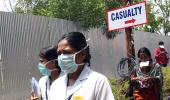Kerala is the only state, other than West Bengal (2001 and 2007), in India to have reported Nipah virus cases.
The previous outbreaks in the state were in May 2018, June 2019 and September 2021. This explains the anticipation and readiness this year, reports Shine Jacob.

Kerala has built a reputation for containing public health crises triggered by viruses.
Having staved off multiple outbreaks of the Nipah virus and after setting an example of screening and surveillance during the COVID-19 pandemic, its latest brush with Nipah shows that Kerala was in a state of preparedness well before the first infection came to light.
On September 12, the Nipah outbreak in Kerala was officially confirmed.
But for the last four days, no new cases were reported after the initial six.
According to sources, the success in preventing a contagion is the outcome of a ground-level monitoring that began as far back as March this year.
This includes the setting up of a dedicated war room at a government guest house in Kozhikode -- it turned out to be the district where all the cases were reported this year -- 19 specialised teams of 190 members overall, a separate team of 200 volunteers, apart from routine presence of the health department’s top members and officials.
The state also enlisted the services of its police and forest department personnel.
Contact tracing (identifying people who may have been exposed to an infected person) was to be carried out to the extent that the police accessed mobile tower locations of patients and even mapped their travel routes with the help of a cyber expert so that there is no missing link.
This was in addition to circulating the patient route maps with timestamps.
So far, six people have been infected, starting on August 30.
Two of them lost their lives. Kozhikode’s district disaster management department has already announced relaxations in the containment zones of nine panchayats.
Kerala is the only state, other than West Bengal (2001 and 2007), in India to have reported Nipah virus cases.
The previous outbreaks in the state were in May 2018, June 2019 and September 2021. This explains the anticipation and readiness this year.
“We realised that there is a Nipah scare between May and October. From March itself, Kerala’s Integrated Disease Surveillance Programme team was monitoring and recording the status in their daily reports,” said an official in the state health ministry.
When the Union government officially announced the Nipah outbreak, the state machinery was able to react immediately.
Kerala health minister Veena George, who is camping in Kozhikode, has said that the outbreak is completely under control, and more than 200 samples from high-risk contacts tested negative so far. Close to 1,300 people have been traced and categorised into high- and low-risk contacts.
“On the morning of September 12, even before the official announcement by the central government, we started a control room in Kozhikode. We have a 24x7 call centre, and also teams for psychological support, transportation and contact tracing,” George said at an official meeting.
The call centre has so far attended over 1,100 calls and tried to address concerns over the phone.
“We have around three meetings a day,” said TS Anish, associate professor of community medicine at Manjeri Medical College in Malappuram district and part of the Nipah response team.
He added: “As part of a surveillance team, we do contact tracing, track route map of patients and other disease-related investigations. The state police also help in this.”
The 19 teams have a maximum of 10 members each. Besides, other units have been tasked with duties such as test and result management, linking suspected cases to the index case, managing contact list, patient transportation, material and logistics, and dead bodies, as well as data analysis, infection control and coordinating with private hospitals.
“We are continuing tests. There will be an incubation period of 21 days, and after that we are going for another incubation period of 21 days,” George said.
In 2018, the state was widely appreciated for its handling of the first Nipah strike.
Not surprisingly, the Centre team has expressed confidence in Kerala’s health department this time around, too.












 © 2025 Rediff.com -
© 2025 Rediff.com -